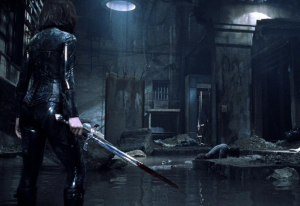On Monday, The CW’s Black Lightning will end its run after four seasons on the network, bringing to a close not only the story of Jefferson Pierce/Black Lightning but also ending a groundbreaking chapter of superhero television. While Black Lightning certainly wasn’t the first live-action series to center around a Black superhero, it was a rarity — a series that focused on a family of Black heroes, each one with unique experiences and perspectives. While a spinoff series, Painkiller, is in development, the end of Black Lightning will generally see that family of heroes depart the television landscape, leaving a huge absence in terms of representation. It’s an absence that diminishes the authenticity of the stories about the human experience that we tell across all superhero entertainment and only has one solution: we need more Black superheroes on television.
Videos by ComicBook.com
Representation of all groups of people across all forms of media is critically important. Removing ideologies from the equation, the reality is that the world in which we as audiences and consumers live is multi-faceted, multicultural, and multi-racial. Our world is not one specific thing and neither should be our stories. To tell authentic stories of the human experience, we need that representation generally speaking, but with superhero stories in particular it is especially important. Superhero stories are, writ large, centered around the idea of fighting injustice. Events over the last several years — and I am specifically referencing incidents of police brutality and the Black Lives Matter movement — have brought to light like never before the deep issues of racial injustice in the United States, especially within the Black community. Racial inequality exists and it impacts every facet of life. With superheroes meant to represent the best of us and taking the form of those who serve to protect the world from various forces of evil and injustice, the heroes we bring to life need to represent those diverse and under-served communities.
And when our heroes are more diverse, the significance and impact of that diversity is very apparent. One major example of this is Batwoman. With Ruby Rose’s exit at the end of Season 1 of that series, Javicia Leslie was cast as a new character, Ryan Wilder, who stepped into the role of Batwoman, making the hero a Black woman for the first time. Almost immediately, Ryan’s Batwoman shined a light on the injustice and corruption in Gotham that Kate Kane’s Batwoman, a privileged white woman, never would have and in the process, gave voice to a population of Gothamites that mainstream superhero stories usually do not. An excellent example of this is in the episode “Fair Skin, Blue Eyes” when a young Black boy asks Batwoman to help find his brother, Kevin, who has been missing for two months and whose disappearance has mostly been overlooked by the authorities. The implication here is that the disappearance of a white child would be taken more seriously, something that the episode plays out to a fine point in flashback when Ryan herself was abducted as a child and no one came looking for her while a full-on search party was mobilized for the missing, and white, Beth Kane. It’s Ryan’s lived experience that allows her to ultimately save Kevin and call out Jacob Kane for his part in creating a society that allows for and creates this sort of inequity, forcing him to see a world that is very different from the one he lives in and experiences.
Black Lightning also shed light on the differing experiences of Black Americans throughout its four-season run, taking on issues of police brutality, medical experimentation, and socioeconomic disparity connected to institutional racism. Marvel’s Luke Cage also took on some of these same issues and experiences and when that show was canceled, those stories were lost. One can argue that The Falcon and The Winter Soldier opened up the door for more such stories to be told and explored, but that series is a bit of an outlier as it’s connected to the Marvel Cinematic Universe so most of those tales — particularly that of Sam Wilson as Captain America — will play out not on a weekly series but on the big screen in a single long installment serving an even larger narrative. It’s a little different, as is the situation of the supporting Black heroes that do exist in The CW’s Arrowverse. Those heroes and heroic characters might occasionally get storylines rooted in their direct experience, but not in the same way as when a series is headlined by Black heroes but even accounting for that, when Supergirl ends later this year, we’ll lose two more of those heroes as well (we’re already counting Kelly Olsen’s upcoming transformation into Guardian for this piece.) With those characters, we visit the issues rather than really live with and deal with them. But even at that, when we lose those characters, we lose those stories as well.
Our world is diverse. We need to live with and deal with the truths and realities of that, even in our comic book-based entertainment. We need more, not less.
The heroes that populate our entertainment are meant to reflect the world we live in. They’re meant to offer us the best versions of ourselves while also, in many cases, showing how just one person can make a difference, who can take their pain and struggle and channel it into something for the greater good as they fight evil and injustice. In a world that is rich and diverse across every aspect, the heroes whose stories we tell should reflect that. While we genuinely need more heroes in all aspects of representation, with Black Lightning ending, The Falcon and the Winter Soldier over, Marvel’s Luke Cage already gone for years at this point, and other shows ending soon, the number of Black heroes represented in superhero television is rapidly dwindling and we simply need more so we can continue to tell richer stories that better represent the entirety of the human experience.
The Black Lightning series final airs Monday, May 24 at 9/8 on The CW.








